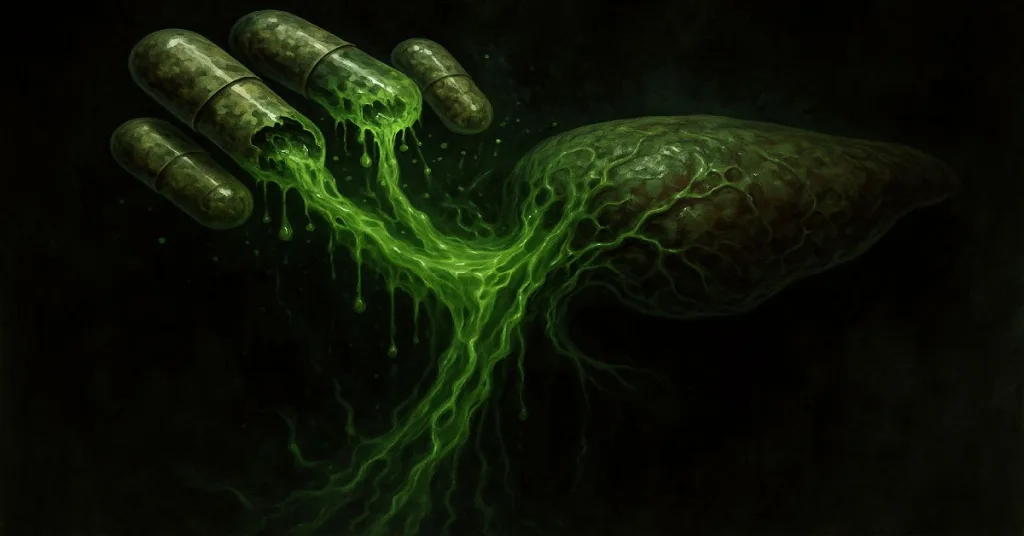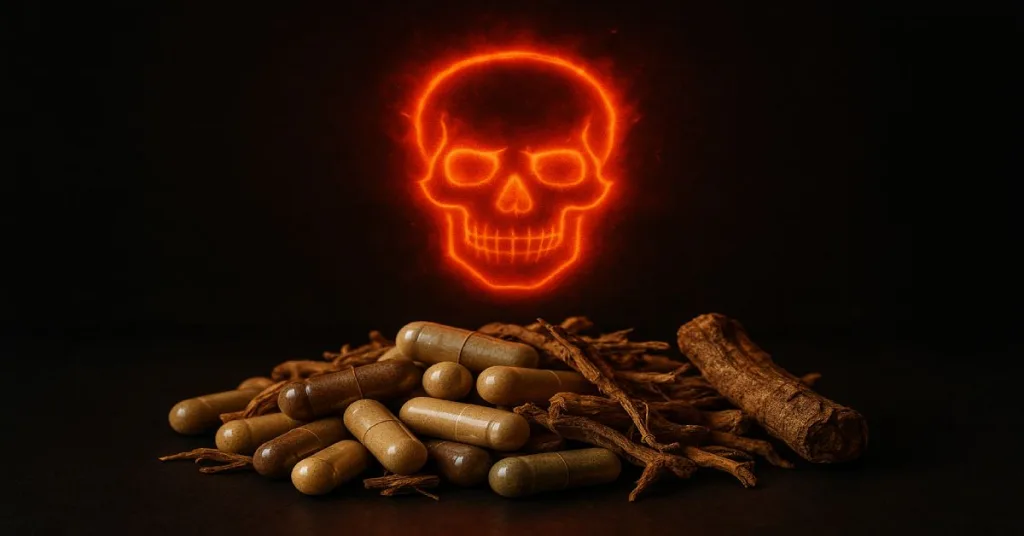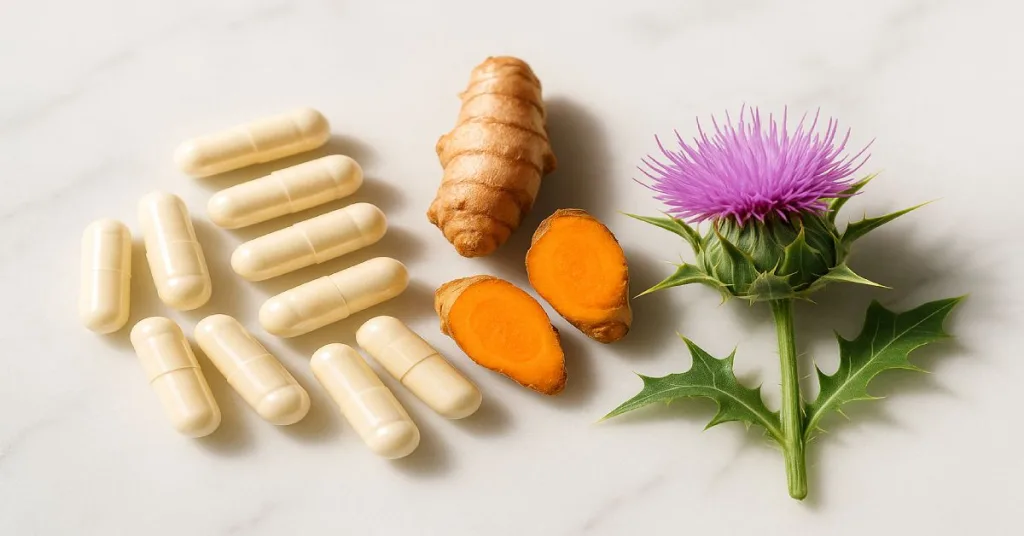Herbal supplements liver damage is a growing problem — ‘natural’ does not mean risk-free. Your liver is the body’s chemical processing plant. When you swallow a concentrated herbal extract, your liver has to break it down and clear it. In some people, that process goes sideways — sometimes mildly (elevated enzymes), sometimes catastrophically (drug-induced liver injury, or DILI).
This guide explains how that happens, which herbs are most often implicated, who’s at highest risk, and specific ways to reduce the danger without falling for industry nonsense.
This post may contain affiliate links. If you click and purchase, I may earn a small commission at no extra cost to you. I only recommend products I personally use or have thoroughly researched.
Why the Liver Is Uniquely Exposed to Herbal Risk
The liver is an incredible organ. It processes nutrients, neutralizes toxins, and keeps blood chemistry stable. But that role also makes it uniquely vulnerable. Here’s why herbal supplements can hit it harder than you think:
- First pass effect: Anything you ingest goes to the liver first through the portal vein. This “first pass” means the liver is the main filter for plant alkaloids, terpenes, and polyphenols — along with any contaminants or adulterants in your capsule.
- Phase I and Phase II detox: Phase I enzymes (like CYP450s) modify molecules, sometimes making them more reactive. Phase II enzymes then try to neutralize and eliminate them. If this process fails or gets overwhelmed, toxic intermediates damage liver cells.
- Genetics and individual variability: Some people have slower detox pathways, making them more vulnerable to injury. Others may tolerate the same herb at the same dose without issue.
- Concentration matters: A teaspoon of turmeric in curry ≠ a capsule standardized to 95% curcuminoids. The concentrated form gives your liver a chemical load it was never designed to handle.

Who’s at Higher Risk
Not everyone who takes herbal supplements ends up with liver injury. But certain groups should be especially cautious:
- People with pre-existing liver disease (fatty liver, hepatitis, cirrhosis)
- Regular alcohol drinkers
- Anyone on multiple medications — especially statins, acetaminophen, antidepressants, anti-seizure meds, or blood thinners
- Those who stack multiple concentrated extracts at once
- People doing detox fasts or very low-calorie diets while taking herbs
- Individuals with a family history of drug-induced liver injury
Case Examples: When “Natural” Turns Dangerous
- Turmeric gone wrong: In 2020, an Italian woman developed severe jaundice after taking high-dose curcumin with piperine for arthritis. Doctors confirmed drug-induced liver injury and symptoms resolved only after stopping.
- Green tea extract recall: Several “fat burner” brands containing concentrated EGCG were pulled after clusters of acute liver failure cases in Europe and the U.S.
- Black cohosh crisis: Case reports from Australia documented women needing liver transplants after black cohosh supplementation for menopause. Mislabeling and species substitution were suspected.
- Kobayashi red yeast rice scandal: In 2020, Japan’s Kobayashi Pharmaceutical recalled its red yeast rice after contamination with citrinin caused dozens of hospitalizations.
These aren’t internet rumors — they’re documented cases in medical journals and public recalls.

The High-Risk List
Green Tea Extract (EGCG)
- Why people take it: Weight loss, “metabolism boosters,” antioxidants.
- Risk: Safe in brewed tea but linked to liver injury at ≥600–800 mg/day in supplement form, especially when fasted.
- Doses: Tea provides ~50–100 mg EGCG per cup. Capsules often contain 200–400 mg. Just 2–3 capsules can cross the danger line.
- Safety tips: Always take with food. Avoid stacking with “fat burners.” Stop immediately if jaundice or abdominal pain develops.
Turmeric/Curcumin (often with Piperine)
- Why people take it: Joint pain, inflammation.
- Risk: High doses can trigger liver injury, especially when combined with piperine, which boosts absorption and drug interactions.
- Doses: Trials use 500–1,500 mg/day. Market capsules deliver 500–1,000 mg with piperine. One or two capsules may overshoot safe ranges.
- Safety tips: Favor food turmeric. Avoid piperine if on medications. Monitor enzymes if supplementing long-term.
Ashwagandha
- Why people take it: Stress, sleep, libido.
- Risk: Documented cases of hepatitis-like injury. Usually reversible, but real.
- Doses: 300–600 mg/day of KSM-66 extract is typical.
- Safety tips: Avoid with thyroid disease. Discontinue if fatigue, jaundice, or itching appear.
Black Cohosh
- Why people take it: Menopausal symptoms.
- Risk: Associated with severe liver injury and even transplants. Contamination and mislabeling worsen risks.
- Doses: 20–40 mg extract once or twice daily.
- Safety tips: Use only species-verified products. Avoid entirely if you have liver concerns.
Kava
- Why people take it: Anxiety, relaxation.
- Risk: Strong links to liver failure, especially with non-traditional extractions or high doses.
- Doses: Clinical use ~60–120 mg kavalactones/day. Supplements often exceed this.
- Safety tips: Avoid alcohol, acetaminophen, and sedatives while using. Limit to short-term use only.
Red Yeast Rice
- Why people take it: Cholesterol lowering.
- Risk: Contains monacolin K, identical to lovastatin. Can cause statin-like side effects (enzyme elevations, muscle pain). Some products contaminated with citrinin.
- Doses: 3–10 mg monacolin K/day is effective. Market labels rarely disclose actual amounts.
- Safety tips: Never combine with prescription statins. Choose citrinin-tested brands only.
Comfrey
- Why people take it: Traditional healing.
- Risk: Contains pyrrolizidine alkaloids that directly cause liver failure.
- Safety tips: Never use internally. Avoid topicals on broken skin.
Chaparral
- Why people take it: “Detox,” anti-aging hype.
- Risk: Multiple reports of hepatitis, sometimes severe.
- Safety tips: Avoid entirely.
Garcinia Cambogia
- Why people take it: Weight loss.
- Risk: Linked to liver damage, especially in multi-ingredient blends.
- Doses: Commonly 900–1,500 mg/day in supplements.
- Safety tips: Avoid “fat burner” blends that contain Garcinia.
He Shou Wu (Polygonum multiflorum)
- Why people take it: Hair growth, longevity.
- Risk: Strongly associated with liver injury in case reports, especially with high-dose or poorly processed roots.
- Doses: Traditional Chinese medicine uses carefully prepared root; modern supplements often skip detox processing.
- Safety tips: Avoid if you value your liver.
Not Just the Herb: Hidden Risks
- Adulteration: Some “natural” supplements are secretly spiked with drugs like sibutramine or sildenafil.
- Contaminants: Heavy metals (lead, arsenic), pesticides, and solvent residues show up in poorly regulated products.
- Proprietary blends: Mask dosages so you can’t tell if you’re overdosing.
Always demand Certificates of Analysis (COAs) and stick to brands that publish them.
Symptoms You Should Never Ignore
If you’re taking supplements and notice these, stop immediately and see a doctor:
- Dark urine
- Yellowing of eyes or skin
- Pain or tenderness in the upper right abdomen
- Unexplained nausea, fatigue, or loss of appetite
- Pale stools or severe itching
Safer Protocols for Herb Use
- Add one supplement at a time.
- Start at half the label dose.
- Reassess after 4–8 weeks.
- Get baseline and follow-up liver labs if stacking or high-risk.
- Avoid combining extracts with alcohol or acetaminophen.
- Don’t take multiple “detox” or “fat burner” products together.
Food-First Alternatives
- Drink brewed green tea instead of EGCG capsules.
- Cook with turmeric in meals instead of curcumin pills.
- Use sleep hygiene and stress management before turning to kava.
- Improve cholesterol with fiber, weight management, and diet before trying red yeast rice.

Safer Options: Supplements That May Support Liver Health
Not every supplement harms the liver. A few have research showing they may protect it — especially in people with high stress on their detox system. These are worth considering if your goal is to actually support liver function:
Milk Thistle (Silymarin)
- How it works: Antioxidant and membrane-stabilizing effects. Used for centuries in Europe for liver complaints.
- Evidence: Several trials show lower ALT/AST enzymes in patients with fatty liver or hepatitis taking standardized silymarin.
- Typical dose: 140–420 mg/day standardized extract.
- Best for: People with mild enzyme elevations, fatty liver, or long-term medication use.
N-Acetyl Cysteine (NAC)
- How it works: Restores glutathione, the liver’s master antioxidant. Clinically proven in hospitals as the antidote for acetaminophen overdose.
- Evidence: Strong in acute toxicity, growing support for chronic liver stress.
- Typical dose: 600–1,200 mg/day.
- Best for: People exposed to oxidative stress, alcohol, or high medication loads.
Turmeric (Food Form)
- How it works: Whole turmeric in cooking supports healthy inflammation balance without overloading the liver.
- Evidence: Long culinary history with virtually no risk in food amounts.
- Best for: Daily, low-risk anti-inflammatory support.
Schisandra (Wu Wei Zi)
- How it works: Traditional Chinese berry that supports liver enzyme activity.
- Evidence: Early but promising — used in TCM for hepatitis support.
- Typical dose: 500–1,000 mg/day.
- Best for: People seeking a traditional herbal tonic with careful, short-term use.
Myths vs Facts
- Myth: Natural means safe.
Fact: Nature produces poisons too. Concentrated extracts magnify risks. - Myth: If it caused damage, it would be banned.
Fact: Supplements are removed only after enough harm is proven. Regulation is reactive, not proactive. - Myth: Detox cleanses protect the liver.
Fact: The liver already detoxes — it needs protein, hydration, and micronutrients, not more pills. - Myth: Milk thistle fixes any damage.
Fact: Silymarin is not an antidote. Stopping the offending supplement is step one.
Buying Guide: How to Choose Safer Supplements
- Look for third-party seals: USP, NSF, ConsumerLab are gold standards.
- Check COAs: Reputable brands publish batch-specific COAs online.
- Skip proprietary blends: If they won’t tell you the dose, don’t trust them.
- Choose single-ingredient extracts: Clear labels beat “detox mixes.”
- Watch serving sizes: Mega-dose marketing is a red flag.
- Research recalls: A quick search for the brand + “recall” can save your liver.
FAQs
Q: Can I safely take green tea extract if I drink green tea every day?
A: Brewed tea is safe for most people. Supplements deliver much higher doses of EGCG and should be used cautiously, if at all.
Q: Do liver detox teas work?
A: No. Your liver already detoxifies your body. These teas often stress it further.
Q: Is milk thistle safe for the liver?
A: Generally yes, but evidence for reversing injury is limited. It’s not a license to keep taking harmful supplements.
Q: How common is supplement-induced liver injury?
A: Studies estimate supplements cause 15–20% of drug-induced liver injury cases in the U.S., and the number is rising.
Bottom Line
Herbal supplements can be powerful tools, but concentrated extracts stress the liver in ways people underestimate. Risk depends on dose, duration, stacking, alcohol, and your individual biology. If you choose to use them, treat them like drugs: verify quality, start low, set limits, and listen to early warning signs.
Your liver doesn’t get a second chance. Protect it by making smarter choices — and if you want supplements for actual liver support, stick to well-studied options like NAC and milk thistle instead of gambling on risky herbs.
This article is for educational purposes only and is not medical advice. Supplements are not reviewed by the FDA to diagnose, treat, cure, or prevent disease. Always consult a healthcare professional before starting or stopping any supplement.
Sources
- National Library of Medicine. LiverTox: Clinical and Research Information on Drug-Induced Liver Injury. https://www.ncbi.nlm.nih.gov/books/NBK547852/
- Weill Cornell Medicine. Liver Damage Caused by Supplements Is Becoming More Common. https://weillcornell.org/news/liver-damage-caused-by-supplements-is-becoming-more-common
- Yale New Haven Health. Supplements and Liver Damage. https://www.ynhhs.org/articles/supplements-liver-damage
- Medical News Today. 6 Popular Herbal Supplements Linked to Liver Risks. https://www.medicalnewstoday.com/articles/6-popular-herbal-supplements-green-tea-curcumin-linked-potential-liver-risks
- Women’s Health Magazine. What to Know About Kratom and Addiction. https://www.womenshealthmag.com/health/a66301420/kratom-addiction/
- News-Medical. Fad Diets and Supplements Fuel Hidden Skin Problems. https://www.news-medical.net/news/20250722/Fad-diets-and-supplements-fuel-new-wave-of-hidden-skin-problems-study-finds.aspx
- American Cancer Society. Dietary Supplements and Cancer Treatment. https://www.cancer.org/cancer/supportive-care/integrative-medicine/dietary-supplements.html